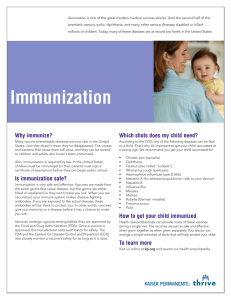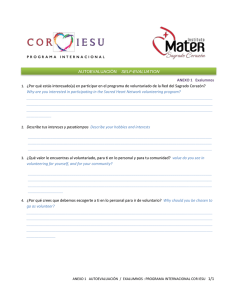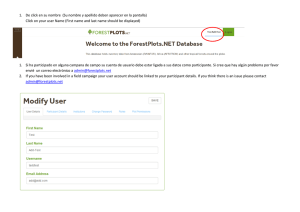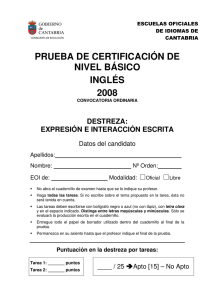Immunization Before, During, and After Pregnancy
Anuncio
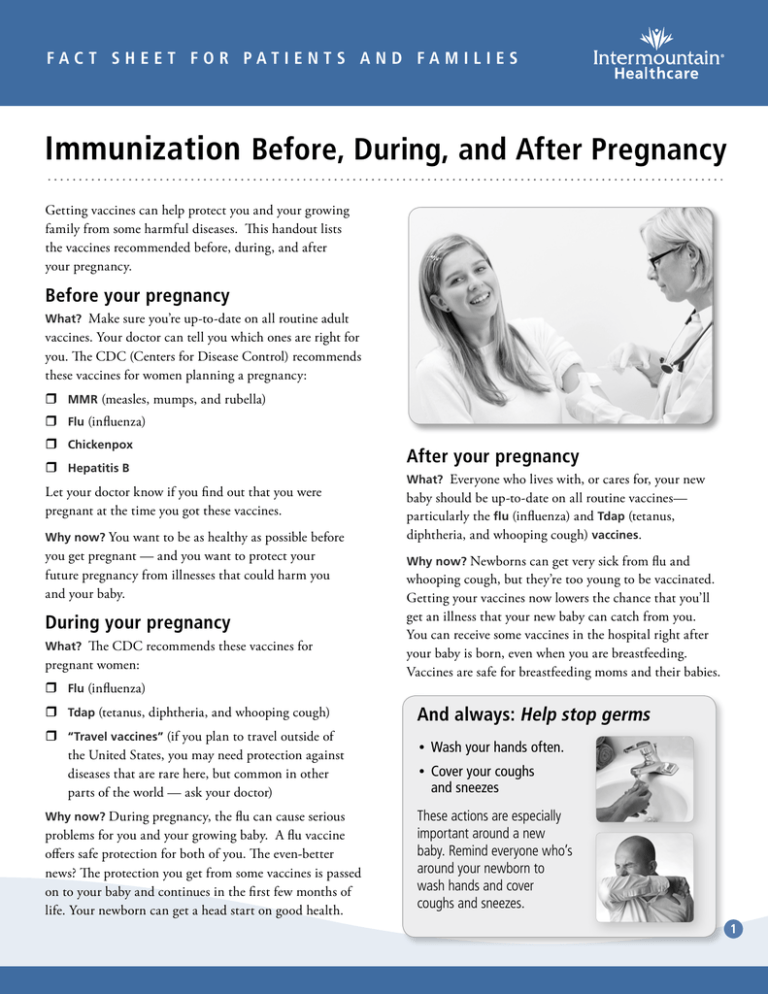
FACT SHEET FOR PATIENTS AND FAMILIES Immunization Before, During, and After Pregnancy Getting vaccines can help protect you and your growing family from some harmful diseases. This handout lists the vaccines recommended before, during, and after your pregnancy. Before your pregnancy What? Make sure you’re up-to-date on all routine adult vaccines. Your doctor can tell you which ones are right for you. The CDC (Centers for Disease Control) recommends these vaccines for women planning a pregnancy: MMR (measles, mumps, and rubella) Flu (influenza) Chickenpox Hepatitis B Let your doctor know if you find out that you were pregnant at the time you got these vaccines. Why now? You want to be as healthy as possible before you get pregnant — and you want to protect your future pregnancy from illnesses that could harm you and your baby. During your pregnancy What? The CDC recommends these vaccines for pregnant women: Flu (influenza) Tdap (tetanus, diphtheria, and whooping cough) “Travel vaccines” (if you plan to travel outside of the United States, you may need protection against diseases that are rare here, but common in other parts of the world — ask your doctor) Why now? During pregnancy, the flu can cause serious problems for you and your growing baby. A flu vaccine offers safe protection for both of you. The even-better news? The protection you get from some vaccines is passed on to your baby and continues in the first few months of life. Your newborn can get a head start on good health. After your pregnancy What? Everyone who lives with, or cares for, your new baby should be up-to-date on all routine vaccines— particularly the flu (influenza) and Tdap (tetanus, diphtheria, and whooping cough) vaccines. Why now? Newborns can get very sick from flu and whooping cough, but they’re too young to be vaccinated. Getting your vaccines now lowers the chance that you’ll get an illness that your new baby can catch from you. You can receive some vaccines in the hospital right after your baby is born, even when you are breastfeeding. Vaccines are safe for breastfeeding moms and their babies. And always: Help stop germs •• Wash your hands often. •• Cover your coughs and sneezes These actions are especially important around a new baby. Remind everyone who’s around your newborn to wash hands and cover coughs and sneezes. 1 La vacunación antes, durante y después del embarazo Las vacunas pueden ayudarle a protegerla a usted y a su familia contra algunas enfermedades. Este folleto enumera las vacunas recomendadas antes, durante y después del embarazo. Antes del embarazo ¿Cuáles? Asegúrese de estar al día con todas las vacunas de rutina para adultos. Su médico puede decirle cuáles son adecuadas para usted. El CDC (Centros para el Control de Enfermedades) recomienda las siguientes vacunas para las mujeres que planean un embarazo: MMR (sarampión, paperas y rubeola) Gripe (influenza) Chickenpox Después del embarazo Hepatitis B ¿Cuáles? Todas las personas que cuiden o vivan con su Si usted estaba embarazada cuando le dieron estas vacunas, por favor dígale a su médico. ¿Por qué ahora? Usted debe estar lo más saludable posible antes de quedar embarazada - y debe proteger su futuro embarazo contra enfermedades que podrían hacerle daño a usted y a su bebé. Durante su embarazo ¿Cuáles? El CDC recomienda las siguientes vacunas para las mujeres embarazadas: Gripe (influenza) Tdap (tétanos, difteria y tos ferina) “Vacunas de viaje” (si planea viajar fuera de los Estados Unidos, es posible que necesite protección contra algunas enfermedades que no son muy frecuentes aquí, pero sí en otras partes del mundo — consulte con su médico) ¿Por qué ahora? Durante el embarazo, la gripe puede causarle problemas graves a usted y a su bebé en desarrollo. La vacuna contra la gripe ofrece protección segura para los dos. Además, ¿quiere mejores noticias? La protección que obtiene de algunas vacunas se transmite a su bebé y continúa en los primeros meses de vida. Su recién nacido tendrá la ventaja de contar con un buen estado de salud. bebé deberán actualizar todas sus vacunas, especialmente las vacunas contra la gripe (influenza) y la Tdap (tétanos, difteria y tos ferina). ¿Por qué ahora? Los recién nacidos pueden enfermarse gravemente de una gripe y tos ferina pero son demasiado pequeños para vacunarlos. Si usted se vacuna ahora, reduce la probabilidad de contraer enfermedades que después puede transmitir a su bebé. Usted se puede vacunar en el hospital inmediatamente después de que nazca su bebé, incluso cuando esté amamantando. Las vacunas son seguras para las madres lactantes y sus bebés. Y siempre: Ayude a evitar los gérmenes •• Lávese las manos frecuentemente. •• Cubra su nariz y boca al toser y estornudar. Estas medidas son especialmente importantes cuando está cerca de su recién nacido. Recuérdele a todas las personas en contacto con su recién nacido que se laven las manos y se cubran su nariz y boca al toser y estornudar. Immunization Before, During, and After Pregnancy © 2011 Intermountain Healthcare. All rights reserved. The content presented here is for your information only. It is not a substitute for professional medical advice, and it should not be used to diagnose or treat a health problem or disease. Please consult your healthcare provider if you have any questions or concerns. More health information is available at intermountainhealthcare.org. Patient and Provider Publications 801-442-2963 fs285 - 12/11 (Spanish translation 11/11 by Lingotek, Inc.) 2

